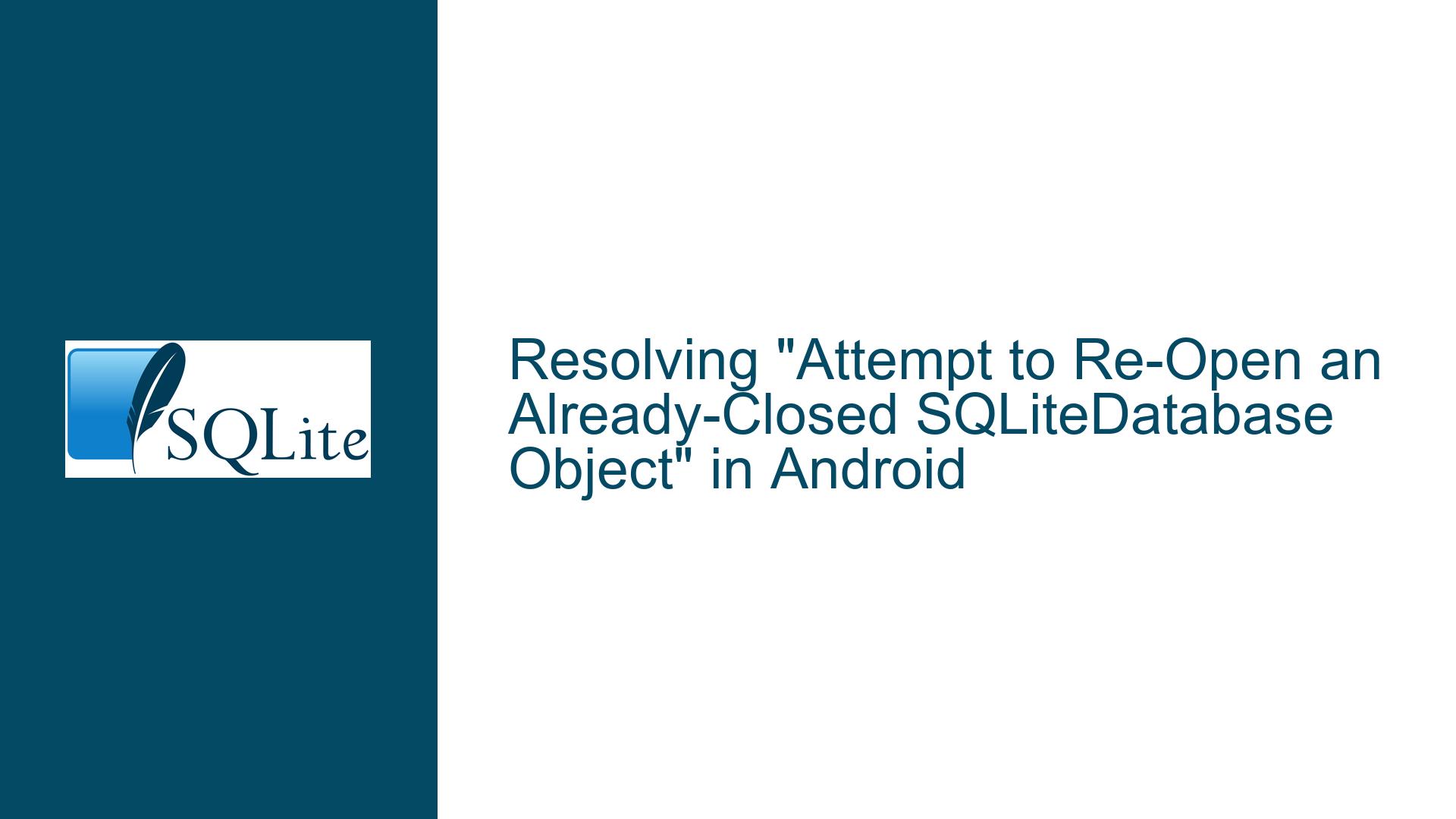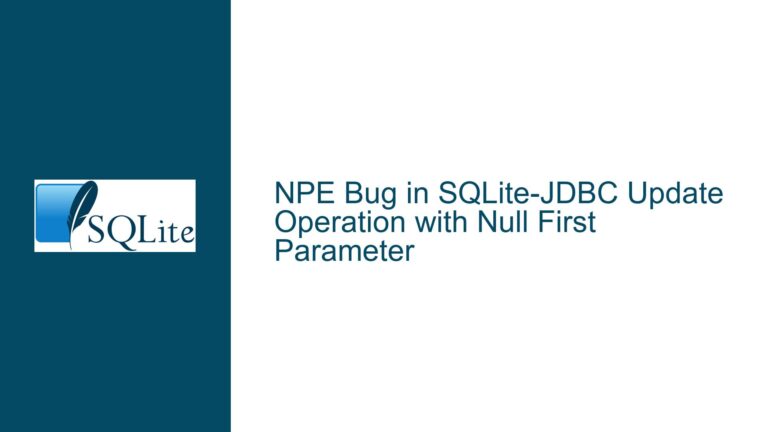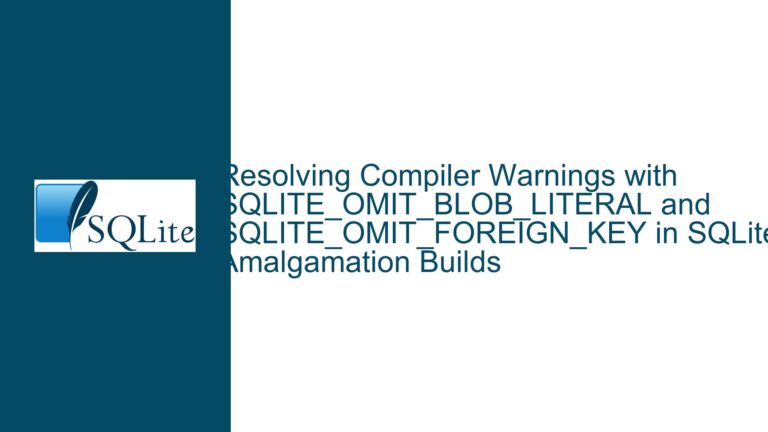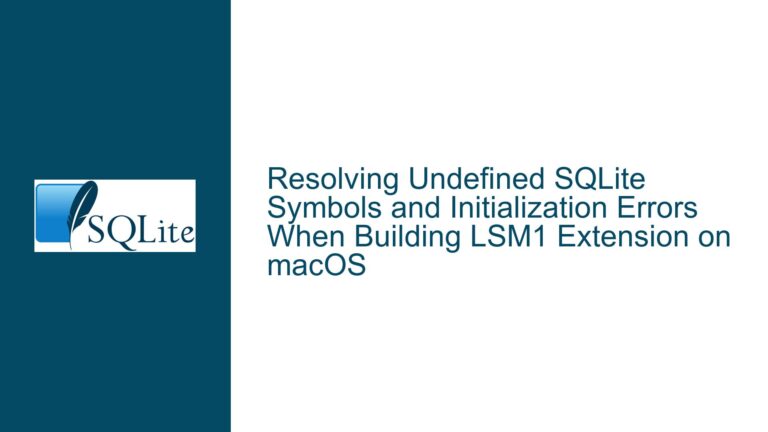Resolving “Attempt to Re-Open an Already-Closed SQLiteDatabase Object” in Android
Issue Overview: IllegalStateException in SQLiteDatabase on Android
The core issue revolves around an IllegalStateException being thrown in an Android application with the message: "attempt to re-open an already-closed object: SQLiteDatabase." This exception occurs when the application attempts to interact with a SQLite database object that has already been closed, leading to a fatal crash. The stack trace indicates that the issue arises during the execution of database transactions, specifically when the endTransaction method is called. The database in question is part of the Android Jetpack WorkManager library, which manages background tasks and relies on SQLite for persistence.
The stack trace reveals that the error propagates through several layers of the Android framework and the Room persistence library. Key components involved include SQLiteClosable, FrameworkSQLiteDatabase, WorkDatabase, and RoomDatabase. The error occurs during the onOpen callback of the WorkDatabase class, which suggests that the database connection is being accessed or manipulated after it has been closed. This is a critical issue because it disrupts the normal flow of database operations, leading to application instability.
The IllegalStateException is a runtime exception, meaning it is not caught at compile time and can cause the application to crash if not handled properly. The specific context of this error—attempting to re-open a closed database object—indicates a potential flaw in the lifecycle management of the database connection. This could stem from improper handling of database instances, race conditions, or incorrect assumptions about the state of the database object.
Understanding the lifecycle of SQLite database objects in Android is crucial to diagnosing this issue. In Android, SQLite databases are managed through the SQLiteOpenHelper class, which provides a high-level interface for creating, opening, and managing database connections. The SQLiteDatabase object represents an active connection to the database, and its lifecycle must be carefully managed to avoid issues like the one described. When a database object is closed, it should no longer be used for any operations. Attempting to do so results in the IllegalStateException observed here.
The stack trace also highlights the involvement of the Room persistence library, which is an abstraction layer built on top of SQLite. Room simplifies database interactions by providing compile-time checks and reducing boilerplate code. However, it also introduces additional layers of complexity, particularly in managing database connections and transactions. The error occurs during a transaction, which suggests that the transaction management logic may be flawed or that the database connection is being closed prematurely.
In summary, the issue is a lifecycle management problem where a SQLite database object is being accessed after it has been closed. This results in an IllegalStateException and causes the application to crash. The error is deeply rooted in the interaction between the Android framework, the Room library, and the application’s database management logic. Resolving this issue requires a thorough understanding of how database connections are managed in Android and how to ensure that database objects are not accessed after they have been closed.
Possible Causes: Misaligned Database Lifecycle Management
The root cause of the IllegalStateException lies in the misalignment of the database object’s lifecycle with the application’s operations. Several factors could contribute to this misalignment, each requiring careful consideration to diagnose and resolve the issue effectively.
1. Premature Closure of Database Connections:
One of the most common causes of this issue is the premature closure of the database connection. In Android, database connections are managed through the SQLiteOpenHelper class, which provides methods for opening and closing the database. If the database is closed while there are still pending operations or transactions, subsequent attempts to access the database will result in an IllegalStateException. This can happen if the application explicitly calls the close method on the database object or if the SQLiteOpenHelper is improperly configured to close the database under certain conditions.
2. Race Conditions in Multi-threaded Environments:
Android applications often perform database operations on background threads to avoid blocking the main thread. However, this introduces the possibility of race conditions, where multiple threads attempt to access the database simultaneously. If one thread closes the database while another is still using it, the latter thread will encounter the IllegalStateException. This is particularly problematic in applications that use the Room library, as Room manages database connections internally and may close them unexpectedly if not configured correctly.
3. Incorrect Use of Room’s Database Lifecycle Methods:
The Room persistence library provides several methods for managing the lifecycle of database connections, such as beginTransaction, endTransaction, and close. If these methods are used incorrectly, they can lead to the premature closure of the database. For example, calling endTransaction without a corresponding beginTransaction can cause the database to be closed unexpectedly. Similarly, calling close on a database object that is still in use can result in the IllegalStateException.
4. Improper Handling of Database Callbacks:
The stack trace indicates that the error occurs during the onOpen callback of the WorkDatabase class. This suggests that the issue may be related to how database callbacks are handled. If the onOpen callback is invoked after the database has been closed, it can lead to the IllegalStateException. This could happen if the callback is registered incorrectly or if the database is closed before the callback is executed.
5. Configuration Issues in the WorkManager Library:
The error occurs in the context of the Android Jetpack WorkManager library, which uses SQLite to persist work requests. If the WorkManager is not configured correctly, it may close the database prematurely or fail to manage database connections properly. This could be due to incorrect initialization of the WorkManager, misconfigured database settings, or bugs in the WorkManager library itself.
6. Memory Pressure and Resource Management:
In some cases, the IllegalStateException may be triggered by memory pressure or resource management issues. If the system is under heavy memory pressure, it may close database connections to free up resources. If the application attempts to access a closed database connection, it will result in the IllegalStateException. This is more likely to occur in applications that handle large amounts of data or perform complex database operations.
7. Bugs in the Android Framework or Room Library:
While less common, it is possible that the issue is caused by a bug in the Android framework or the Room library. If the framework or library incorrectly manages database connections, it can lead to the premature closure of the database and the resulting IllegalStateException. This is more likely to occur in older versions of the framework or library, where such bugs may not have been fixed.
In summary, the IllegalStateException is caused by a misalignment in the lifecycle management of the SQLite database object. This misalignment can result from premature closure of database connections, race conditions in multi-threaded environments, incorrect use of Room’s lifecycle methods, improper handling of database callbacks, configuration issues in the WorkManager library, memory pressure, or bugs in the Android framework or Room library. Diagnosing the exact cause requires a thorough examination of the application’s database management logic and the context in which the error occurs.
Troubleshooting Steps, Solutions & Fixes: Ensuring Proper Database Lifecycle Management
Resolving the IllegalStateException requires a systematic approach to ensure that the database object’s lifecycle is properly managed. Below are detailed steps to diagnose and fix the issue, along with potential solutions and best practices to prevent similar issues in the future.
1. Review Database Lifecycle Management:
The first step is to review how the application manages the lifecycle of the SQLite database object. Ensure that the database is not being closed prematurely and that all database operations are completed before the database is closed. This involves checking the usage of the SQLiteOpenHelper class and ensuring that the close method is only called when the database is no longer needed. Additionally, verify that the database is not being closed while there are pending transactions or operations.
2. Implement Proper Transaction Management:
Transactions are a critical part of database operations, and improper transaction management can lead to the IllegalStateException. Ensure that all transactions are properly started and ended using the beginTransaction and endTransaction methods. Avoid calling endTransaction without a corresponding beginTransaction, as this can cause the database to be closed unexpectedly. Additionally, consider using the try-finally block to ensure that transactions are always properly ended, even if an exception occurs.
3. Synchronize Database Access in Multi-threaded Environments:
If the application performs database operations on multiple threads, it is essential to synchronize access to the database to avoid race conditions. Use synchronization mechanisms such as locks or semaphores to ensure that only one thread can access the database at a time. This prevents situations where one thread closes the database while another is still using it. Additionally, consider using thread-safe database access patterns, such as the SerialExecutor provided by the Room library.
4. Verify Room’s Database Lifecycle Methods:
The Room persistence library provides several methods for managing the lifecycle of database connections. Ensure that these methods are used correctly and that the database is not being closed prematurely. Specifically, verify that the close method is only called when the database is no longer needed and that all pending operations are completed before closing the database. Additionally, check the usage of the beginTransaction and endTransaction methods to ensure that transactions are properly managed.
5. Handle Database Callbacks Correctly:
The stack trace indicates that the error occurs during the onOpen callback of the WorkDatabase class. Ensure that this callback is handled correctly and that the database is not being closed before the callback is executed. If necessary, modify the callback logic to ensure that the database remains open while the callback is being executed. Additionally, verify that the callback is registered correctly and that it is not being invoked after the database has been closed.
6. Configure the WorkManager Library Properly:
The error occurs in the context of the Android Jetpack WorkManager library, which uses SQLite to persist work requests. Ensure that the WorkManager is configured correctly and that the database is not being closed prematurely. This involves checking the initialization of the WorkManager, verifying the database settings, and ensuring that the WorkManager is managing database connections properly. If necessary, consult the WorkManager documentation or seek assistance from the Android developer community.
7. Monitor Memory Pressure and Resource Management:
In some cases, the IllegalStateException may be triggered by memory pressure or resource management issues. Monitor the application’s memory usage and ensure that the system is not under heavy memory pressure. If necessary, optimize the application’s memory usage and reduce the amount of data stored in the database. Additionally, consider using tools such as the Android Profiler to identify and resolve memory-related issues.
8. Update the Android Framework and Room Library:
If the issue persists, consider updating the Android framework and the Room library to the latest versions. Newer versions of the framework and library may include bug fixes or improvements that resolve the issue. Additionally, check the release notes for any known issues related to database lifecycle management and apply any recommended fixes or workarounds.
9. Implement Robust Error Handling:
Finally, implement robust error handling to catch and handle the IllegalStateException gracefully. This involves wrapping database operations in try-catch blocks and providing appropriate error messages or fallback mechanisms. Additionally, consider logging the error details to help diagnose and resolve the issue in the future.
In summary, resolving the IllegalStateException requires a thorough review of the application’s database lifecycle management, proper transaction management, synchronization of database access in multi-threaded environments, correct usage of Room’s lifecycle methods, proper handling of database callbacks, correct configuration of the WorkManager library, monitoring of memory pressure and resource management, updating the Android framework and Room library, and implementing robust error handling. By following these steps, you can ensure that the database object’s lifecycle is properly managed and prevent the IllegalStateException from occurring.






